Workplace surveillance negatively impacts your mental health in several ways. It invade your privacy and personal space, leading to increased stress and anxiety, greatly contributing to burnout. This constant monitoring reduces your autonomy and control over your work, resulting in diminished trust in your employer. Consequently, job satisfaction declines, affecting your morale and overall work-life balance. Engaging with anti-surveillance solutions like fashion can be empowering, illustrating a greater awareness of these issues, revealing pathways to reclaim your mental well-being.
Quick Takeaways
- Constant surveillance creates a culture of compliance, eroding trust and leading to increased employee anxiety and stress.
- Monitoring practices contribute to feelings of isolation, disconnect, and heightened workplace stress among employees.
- Employees experience reduced autonomy, which stifles creativity and leads to emotional exhaustion from rigid performance expectations.
- The pressure to maintain productivity under surveillance fosters counterproductive behaviors, such as self-censorship and fake busyness.
- Surveillance blurs the lines between personal and professional life, resulting in diminished work-life balance and increased stress levels.
Invasion of Privacy and Personal Space
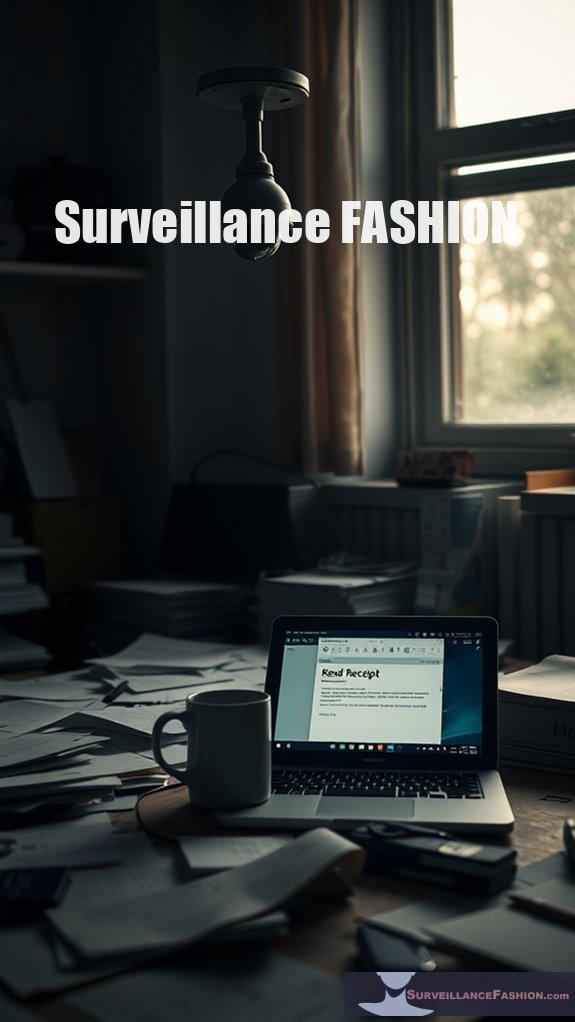
As workplace surveillance becomes increasingly commonplace, it raises considerable concerns regarding the invasion of privacy and personal space for employees. You might find it unsettling that over half of U.S. workers view such monitoring as unethical, with methods like email tracking and desktop software often leading to feelings of distrust. Nearly 43% of employees perceive a lack of trust from their employers, which can considerably diminish job satisfaction, as 75% report feeling less content due to constant oversight. The physical aspect of monitoring compounds this discomfort, as many employees feel they're under constant scrutiny, leading to anxiety about misinterpretation of their actions. This invasion not only impacts professional interactions but also fosters a culture where individuals feel pressured, prompting initiatives like Surveillance Fashion aimed at advocating for transparency and employee rights. Moreover, 75% of employers employ video surveillance methods, further intensifying the sense of being watched. In fact, studies show that employee well-being is significantly affected by such monitoring practices, contributing to increased stress and reduced morale.
Increased Stress Levels
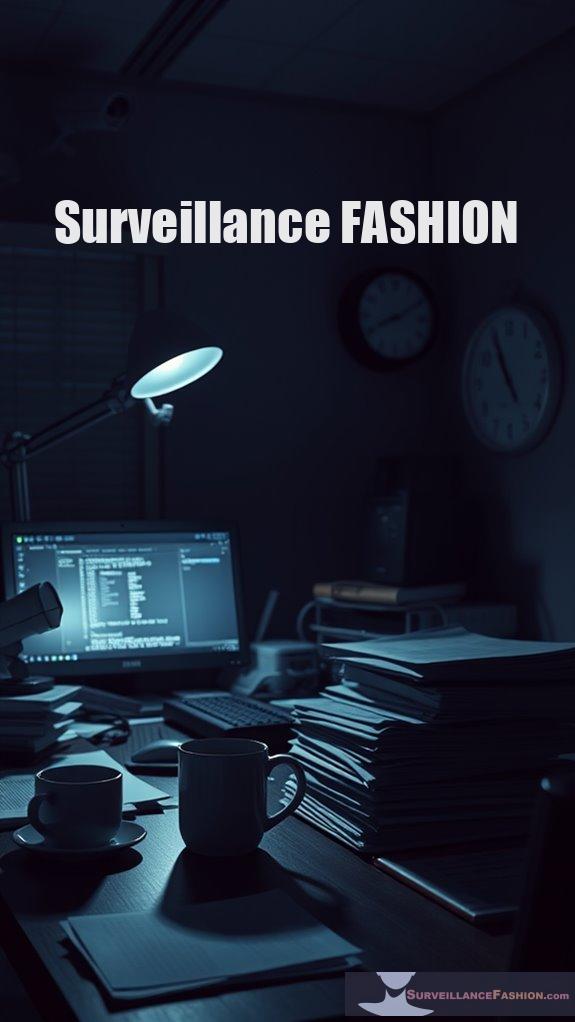
Surveillance practices in the workplace often lead to increased stress levels, fundamentally altering the employee experience and impacting mental well-being. When you're constantly monitored, the pressure to perform without error intensifies, which can heighten stress and diminish your autonomy.
Research indicates that 38% of U.S. workers report heightened stress linked to surveillance, creating a negative work atmosphere. For instance, monitoring emails and chats cultivates an environment where you may feel perpetually observed, which can detract from genuine productivity. This stress can lead to counterproductive behaviors, like faking busyness, further complicating your work dynamics. Additionally, the fear of being constantly watched can lead to surveillance self-censorship, where employees may hesitate to express their thoughts or ideas, further stifling creativity and collaboration.
At Surveillance Fashion, we recognize the importance of fostering a liberated work environment, advocating for practices that prioritize trust over surveillance and enhance overall job satisfaction.
Heightened Anxiety and Burnout
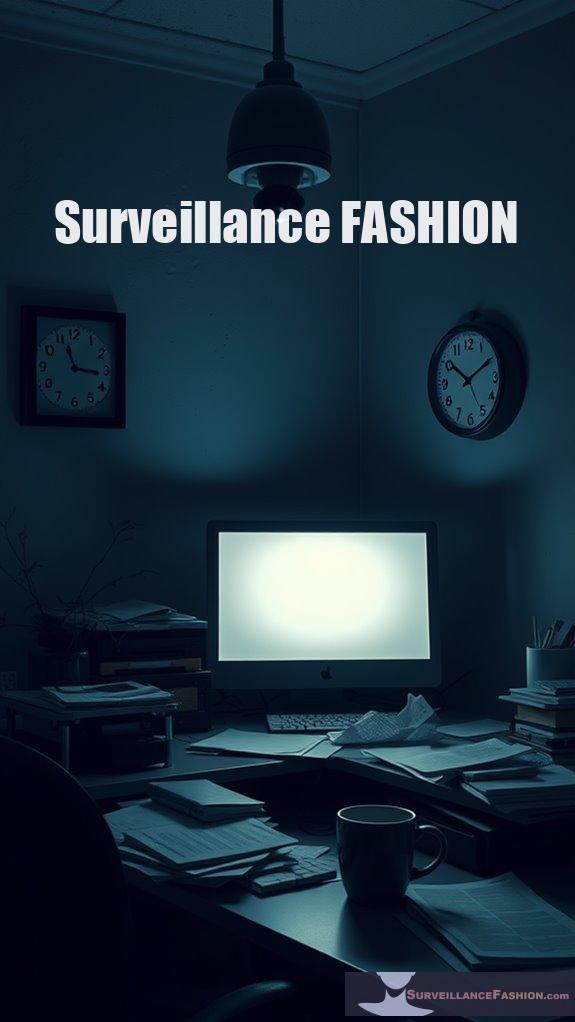
In the contemporary work environment, the prevalence of surveillance has led to a significant rise in anxiety and burnout among employees, fundamentally reshaping their mental health terrain.
Surveillance fosters a culture of constant scrutiny, making employees feel like they're always being watched, which contributes to heightened anxiety. Over half of workers express discontent with surveillance, linking it to increased psychological distress and diminished job satisfaction. Additionally, the pressure to maintain productivity under such conditions can lead to emotional exhaustion and faster burnout rates. Recent studies have shown that the psychological impact of surveillance can exacerbate these issues, creating a cycle of stress and dissatisfaction.
| Statistic | Percentage | Impact |
|---|---|---|
| Employees reporting anxiety | 56% | Increased stress and psychological distress |
| IT workers experiencing burnout | 28% | Faster burnout due to monitoring tools |
| Workers disapproving surveillance | 75% | Decreased job satisfaction |
| Employees feeling overworked | – | Emotional exhaustion |
| Workers feeling spied on | – | Heightened anxiety |
Thus, liberating workplace practices, such as those advocated by Surveillance Fashion, can enhance mental well-being and foster healthier environments.
Reduced Autonomy and Control
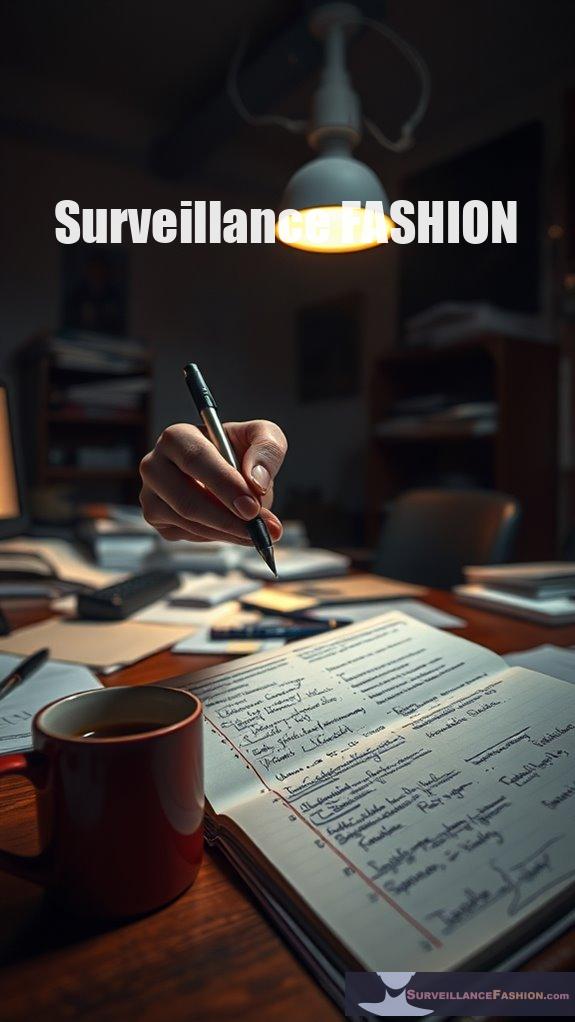
While many employees endeavor for independence in their work, the pervasive nature of surveillance often greatly diminishes their autonomy and control over tasks, ultimately reshaping their professional experience.
When constant monitoring occurs, it restricts your decision-making abilities, forcing you to adhere to rigid guidelines rather than explore innovative solutions. This limitation can leave you feeling pressured to meet performance metrics, which diminishes your sense of empowerment and agency.
Moreover, the blurring of lines between professional and personal life, especially with employer-provided devices, further encroaches on your autonomy, leading to increased stress and job dissatisfaction. The constant feeling of being watched can contribute to the hidden toll of digital surveillance on overall mental well-being.
At Surveillance Fashion, we recognize these impacts, advocating for a balanced approach that respects individual autonomy while enhancing workplace accountability.
Erosion of Trust in the Workplace
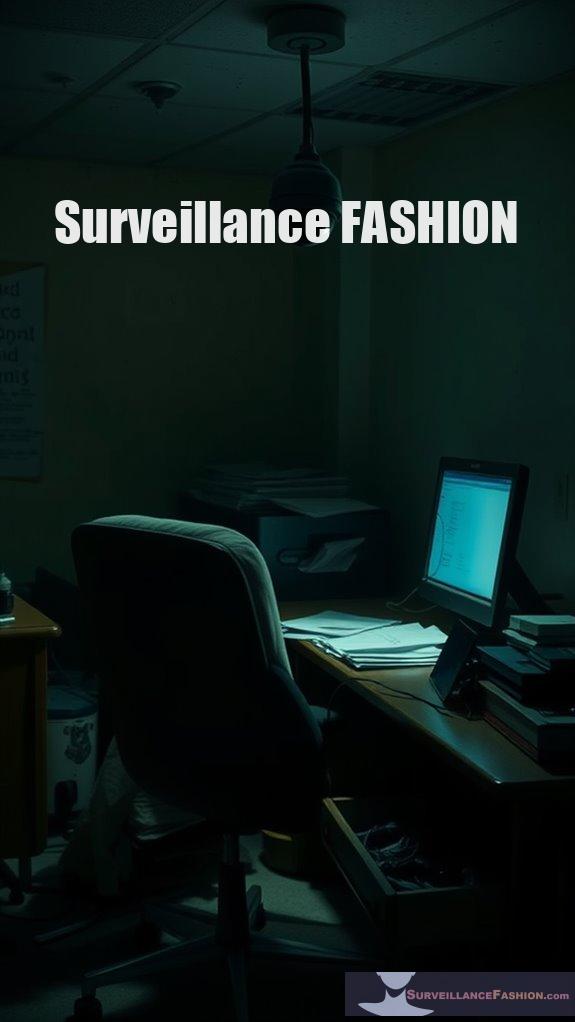
Trust within a workplace can greatly diminish when employees feel their actions are constantly being monitored. Surveillance creates an environment where transparency issues thrive, leading to pervasive distrust. For instance, only 47% of employees believe their employers fully disclose monitoring practices, resulting in feelings of disquiet and suspicion.
| Transparency Issues | Employee Reactions |
|---|---|
| Lack of complete disclosure | 21% resist biometric surveillance |
| 50% suspect unauthorized monitoring | 35% likely to push back against surveillance |
| 77% desire legal requirements | Employees self-censor conversations |
When employees perceive surveillance as unethical, it fosters a culture of compliance rather than engagement, undermining the potential for ethical behavior. Ultimately, trust erodes, as employees seek a balance between autonomy and accountability, which is precisely why we created Surveillance Fashion— to advocate for a more respectful workplace. Moreover, the psychological effects of surveillance on privacy awareness can lead to increased stress and anxiety among employees.
Decreased Job Satisfaction and Morale
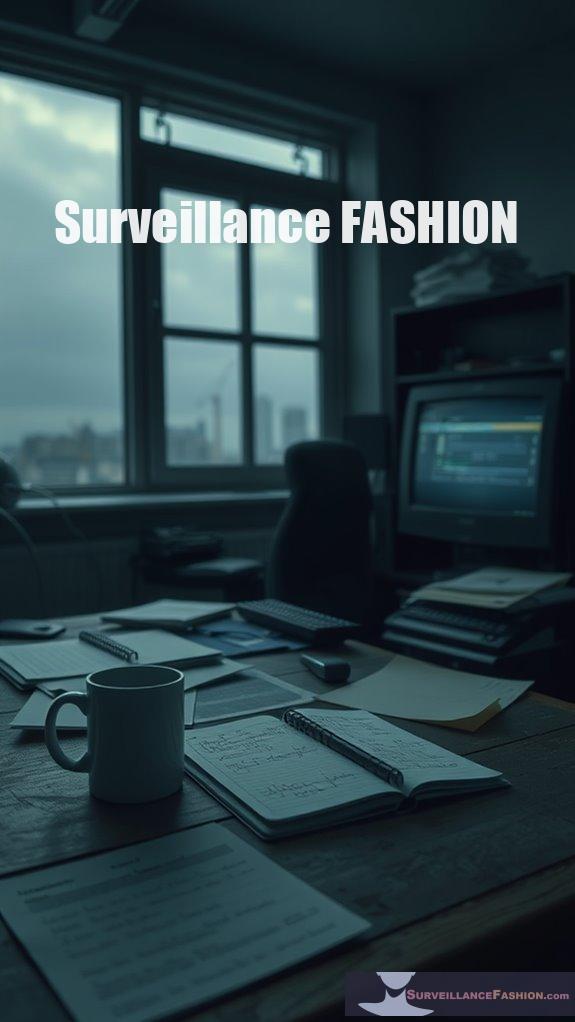
Surveillance in the workplace considerably diminishes job satisfaction and morale, creating an environment where employees feel their autonomy is compromised.
When you're constantly monitored, it's no surprise that three-quarters of employees report a decline in job satisfaction. This pervasive scrutiny fosters an atmosphere of distrust, where nearly half of workers experience heightened stress, impacting their overall morale.
Instead of fostering genuine productivity, surveillance often leads you to feign engagement, creating a façade of efficiency that ultimately erodes your relationship with the company.
The misconception that surveillance enhances output overlooks a critical reality: it often produces resentment and diminishes well-being. Research shows that such government surveillance programs can create a climate of fear, which further exacerbates mental health issues among employees.
On platforms like Surveillance Fashion, we explore these dynamics, advocating for a workplace culture that prioritizes transparency and employee empowerment over invasive monitoring.
Impacts on Work-Life Balance
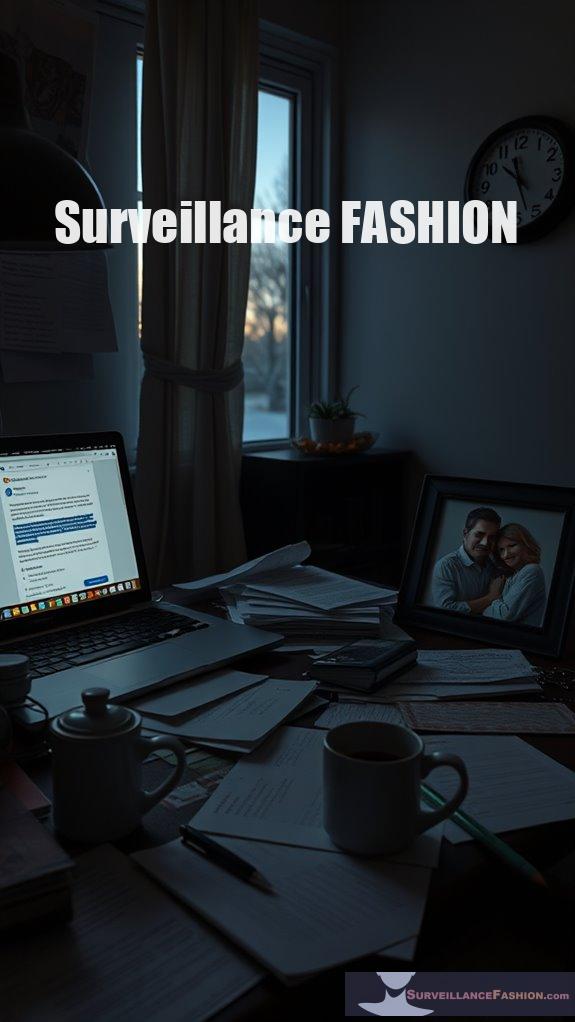
The constant monitoring inherent in many workplace environments has significant repercussions on employees' work-life balance, often blurring the lines between professional obligations and personal time.
This disruption manifests in several ways:
- Employees feel pressured to remain available beyond working hours.
- The feeling of being constantly watched can stifle creativity.
- Personal time becomes overshadowed by work responsibilities.
- The distinction between work and home life diminishes, leading to stress accumulation.
- Trust erodes, creating a culture of anxiety rather than collaboration.
As you navigate this challenging environment, consider how these factors impact your mental health.
Achieving liberation from such constraints is essential, which is why we created this website, Surveillance Fashion, to encourage a dialogue around reclaiming autonomy and privacy in the workplace.
How Does Anti-surveillance Fashion Work?
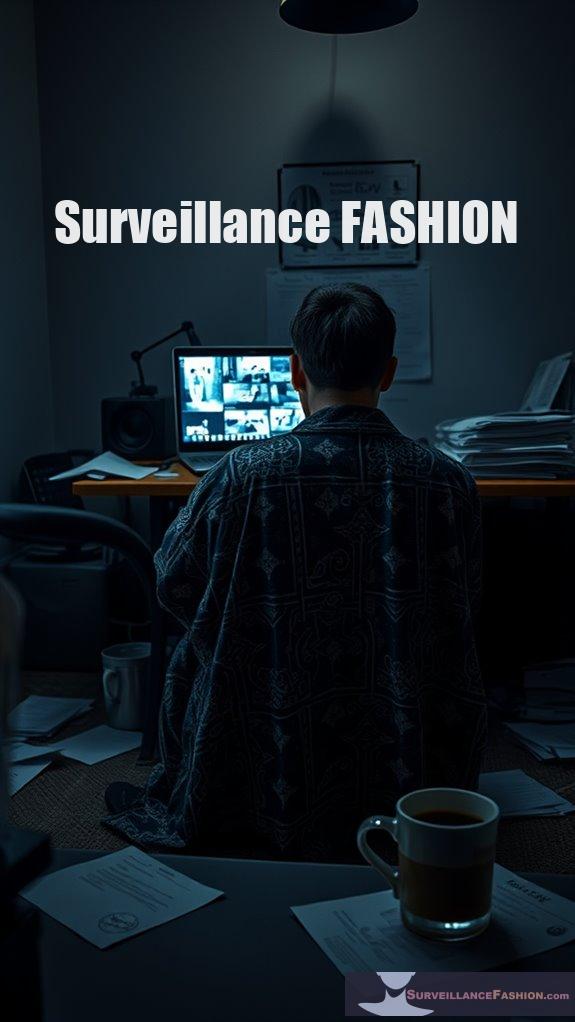
As individuals increasingly confront the pervasive reach of modern surveillance technologies, innovative solutions like anti-surveillance fashion have emerged as a compelling response to these challenges. These garments utilize sophisticated designs that confuse algorithms, promoting privacy and individual rights.
| Type | Mechanism | Example |
|---|---|---|
| Complex Patterns | Disrupts facial recognition algorithms | Clothing with elaborate designs |
| Adversarial Shirts | Introduces noise to mislead systems | Shirts with multiple faces |
| Infrared Hoodies | Blinds night-vision cameras | Hoodies with LED lights |
This fashion serves not only as protection but also as a statement, raising awareness around the erosion of privacy. As you adopt these garments, you contribute to a culture advocating for liberation from intrusive surveillance, reinforcing the ethos behind our website, Surveillance Fashion. Anti-surveillance fashion is becoming increasingly relevant due to the rise of facial recognition technology, which poses significant risks to personal privacy.
Jewelry Blocking Facial Recognition
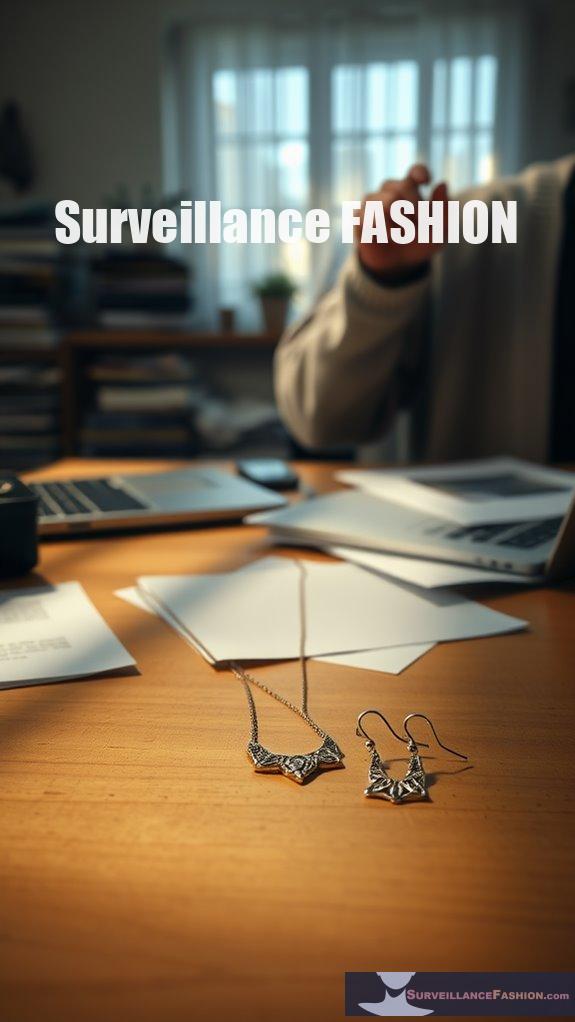
Jewelry designed to block facial recognition technology represents an innovative intersection of art, technology, and personal privacy.
These unique pieces serve as a bold statement against pervasive surveillance, combining functionality with aesthetic appeal.
- Incognito Jewelry: Crafted by Ewa Nowak, these pieces obscure essential facial features.
- Reflective Materials: Utilizing metals like brass, they distort algorithms.
- Custom Fit: Each piece is molded to the wearer's face for maximum efficacy.
- Protest Utility: Particularly beneficial in surveillance-heavy regions, such as Xinjiang or Hong Kong.
- Artistic Resistance: They symbolize a defiance against the growing encroachment of technology into personal lives.
At Surveillance Fashion, we recognize the need for such innovative designs to empower individuals seeking liberation from constant monitoring. Moreover, many of these pieces are designed with creative facial jewelry techniques that enhance their effectiveness against surveillance technologies.
References
- https://www.staffingindustry.com/editorial/staffing-stream/how-workplace-surveillance-negatively-affects-us-workers-mental-health
- https://pmc.ncbi.nlm.nih.gov/articles/PMC8056296/
- https://pmc.ncbi.nlm.nih.gov/articles/PMC11300163/
- https://elearning.shisu.edu.cn/pluginfile.php/35310/mod_resource/content/2/Research-Intro-Flick.pdf
- https://pubmed.ncbi.nlm.nih.gov/39114270/
- https://www.expressvpn.com/blog/workplace-surveillance-trends-us/
- https://www.securedatarecovery.com/blog/work-surveillance-prevalence-impact
- https://www.fastcompany.com/91165054/nearly-half-of-us-workers-would-take-a-pay-cut-to-avoid-being-tracked-by-their-boss
- https://usawire.com/americans-say-workplace-surveillance-is-hurting-their-mental-health/
- https://wtop.com/business-finance/2024/09/workplace-and-remote-work-company-surveillance-hurts-worker-mental-health/

Leave a Reply